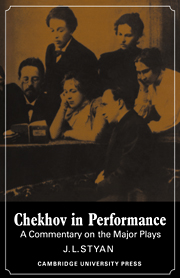Summary
The Cherry Orchard, the supreme achievement of the naturalistic movement in the modern theatre, was Chekhov's last play. It was written and revised when its author was a dying man, his tuberculous condition forcing him to live in the milder air of Yalta on the Black Sea, six or seven hundred miles from rehearsals at the Moscow Art Theatre. Luckily, he had married Olga Knipper, one of the M.A.T.'s leading actresses, on 25 May 1901, and he and his wife corresponded freely about the details of the play, so that our first-hand knowledge of its author's intentions is very full.
Chekhov told Nemirovich-Danchenko that he had spent three years preparing the play, and it seems that he was already planning it during rehearsals for Three Sisters in 1901. Two years later he had only just begun to write, and the first draft was not finished until October 1903. This teasing and weighing of his material is characteristic of Chekhov at the end: he used this long period of gestation as Ibsen might have done, until, as he said, the play was completed in his head. It is clear, for example, that at the beginning he intended to make his play more of a light comedy, and he described it as a ‘Vaudeville’, a term synonymous with ‘farce’, although he may have been speaking idiosyncratically in order to emphasize his comic intentions to those who thought of him as a writer of tragedy.
- Type
- Chapter
- Information
- Chekhov in Performance , pp. 237 - 337Publisher: Cambridge University PressPrint publication year: 1971



